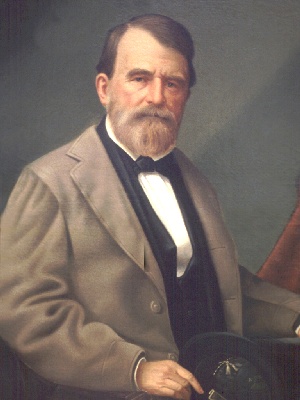John McEnery (Louisiana politician) facts for kids
Quick facts for kids
John McEnery
|
|
|---|---|

John McEnery's portrait, 1880s
|
|
| 25th Governor of Louisiana | |
| In office January 13, 1873 – May 22, 1873 |
|
| Lieutenant | Davidson B. Penn |
| Preceded by | P. B. S. Pinchback |
| Succeeded by | William P. Kellogg |
| Personal details | |
| Born | March 31, 1833 Petersburg, Virginia, U.S. |
| Died | March 28, 1891 (aged 57) New Orleans, Louisiana, U.S. |
| Political party | Democratic |
| Other political affiliations |
Liberal Republican (1870–1872) |
| Military service | |
| Allegiance | |
| Branch/service | |
| Years of service | 1861–1864 |
| Rank | |
| Commands | 4th Louisiana Infantry Battalion |
| Battles/wars | American Civil War |
John McEnery (born March 31, 1833, died March 28, 1891) was a lawyer and politician from Louisiana. He was a member of the Democratic Party. McEnery was at the center of a big argument over who won the 1872 election for Governor of Louisiana.
Democrats believed McEnery won this election. However, the Republican candidate, William Pitt Kellogg, was officially declared the winner. McEnery had been an officer in the Confederate States Army during the American Civil War. The federal government stepped in, and McEnery was not allowed to take office.
Contents
The Disputed Election of 1872
In the 1872 election, John McEnery, a Democrat, had support from a group of Democrats. He was also supported by some Republicans who did not agree with President Ulysses S. Grant. This group included the current Republican Governor, Henry C. Warmoth.
Other Republicans, who were loyal to President Grant, supported the Republican candidate, William Pitt Kellogg.
How the Election Was Handled
Governor Warmoth had chosen the State Returning Board. This board was in charge of counting votes and managing elections. However, a different board supported Kellogg. This second board did not have the actual votes or ballots to count.
Because of the election problems, Governor Warmoth was removed from his job. The lieutenant governor, a Black Republican named P. B. S. Pinchback, became governor for the last 35 days of Warmoth's term. Both McEnery and Kellogg held their own inauguration parties. They each had their own lists of local officials they believed were elected. In the spring of 1873, McEnery and his supporters even formed their own unofficial legislature in New Orleans.
The Battle of Liberty Place
After the election dispute continued, John McEnery encouraged his supporters to take action. In September 1874, about five thousand armed white men entered New Orleans. They fought against the police and the state militia. They took over the statehouse and the armory. They forced Republican Governor Kellogg out of office.
This event is known as the Battle of Liberty Place. McEnery's forces stayed in control until federal troops were sent to New Orleans. Only then did McEnery's supporters leave the city.
Election Disputes and Violence
The long argument over the election caused a lot of violence across Louisiana.
The Colfax Incident
The Colfax Massacre happened on Easter Sunday in 1873. This event was connected to the disputed election. Groups of armed white men attacked Black Republicans. These Black Republicans had gathered at the Colfax courthouse to protect Republican officials. Many people were killed during this attack. Tensions were very high in the area before these events.
Events in Coushatta
Another violent event happened in Coushatta, Louisiana. This town was the main town of the new Red River Parish. Marshall H. Twitchell was an important Republican state senator there. Armed white men forced six Republican officials out of town. Sadly, these officials were killed before they could leave the state.
The White League
In 1874, some white men from Grant Parish formed a group called the White League. Some of these men had been involved in the violence at Colfax. The White League was a paramilitary group. This means they were organized like a military but were not part of the official army. They worked with the Democratic Party to remove Republicans from office. They also tried to stop Black citizens from voting in elections. Grant Parish and Colfax were new areas created after the Civil War. They were named after President Grant and Vice President Schuyler Colfax.
McEnery's Family in Politics
John McEnery's strong connection to the idea of white supremacy helped his brother, Samuel McEnery, in politics. Samuel McEnery was elected Lieutenant Governor of Louisiana in 1880. He later became Governor after the previous governor, Louis Wiltz, died. Samuel McEnery stayed in office until 1888. However, he faced accusations of corruption and was not re-elected that year.
Images for kids
 | Stephanie Wilson |
 | Charles Bolden |
 | Ronald McNair |
 | Frederick D. Gregory |


